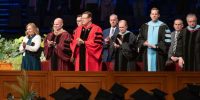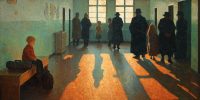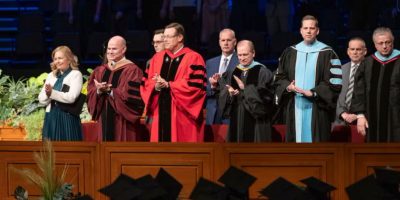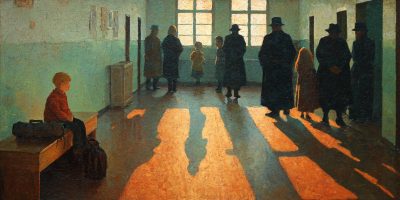This month America lost one of its greatest literary critics, along with one of its greatest admirers of the prophet Joseph Smith.
Harold Bloom was known for saying that if he were born in 19th Century America, and if he were not a Jew, he’d be a Latter-day Saint.
Why?
Bloom’s admiration, even affection, for Joseph grew from his appreciation of prophecy and poetry.
Yes, he would write, Joseph was a religious genius. But, for Bloom he was even more. “Joseph Smith hovers in me,” he once divulged. “There cannot be too many Mormons who are as imbued with him as I am in my own odd way.”
You see, more than most, Bloom was steeped in the great literary revelators—Shakespeare and Dante; Homer and Virgil; Whitman and Blake.
Bloom saw Joseph through this lens, and, well, he wasn’t alone. Brigham Young called Joseph a poet, “and poets are not like other men,” he remarked, “their gaze is deeper, and reaches the roots of the soul; it is like that of the searching eyes of angels, they catch the swift thought of God and reveal it to us.”
Bloom understood poets and a whole lot more. In one of the many recent tributes in the wake of his passing, David Yaffe observed that he, “wrote books at the pace at which most people read them, and he read them at the pace at which most people watched TV.”
Although he was raised in an orthodox Jewish home where only Yiddish was spoken, Bloom came to a kind of Jewish Gnosticism (spiritual knowledge acquired through direct experience). The powerful and passionate God of Moses in the Torah was more appealing to him than the indulgent God of modern religion. There was a time in the late 1960s—a time of personal crisis— where he launched into a study of Jewish mysticism (Kabbalah).
Joseph Smith hovers in me. There cannot be too many Mormons who are as imbued with him as I am in my own odd way.
He preferred being called a Jewish Gnostic than an atheist. When asked about God, he would lament that he couldn’t avoid Him. In his books, Bloom discussed “the path of poetic influence.” He studied the work of Gershom Scholem and attempted to use the structure of Kabbalah to map the path that poets took, building upon or reacting to the work of past writers. His masterwork was The Anxiety of Influence.
Kabbalah is meant to lead the mystic through a journey of knowledge to the divine. This knowledge is gained individually and is not to be trusted to the world at large but only to those who qualify as both dedicated and righteous. In descent from the divine, there are 10 “sefirot” which could be considered as channels of divine creative life force or consciousness from God to man. They are Divine Will (Crown); Conscious Intellect (Wisdom, Understanding); and Conscious Emotions (Kindness, Discipline, Beauty, Eternity, Splendor, Foundation, and Kingship). These extend downward from the Infinite God to the material world and the initiate masters these channels upward until he understands what God knows.
In 1992, Bloom published The American Religion. The book is “religious criticism” that focuses partly on the history of various American religions, but mostly on their spiritual values. He centers on the use of religion for Americans who have grown a culture that focuses on the individual. Thus, he looked not for communal paths to salvation but for the enabling of a one-to-one confrontation with the divine. He believed Joseph prevailed in his wrestle with the angel: “Smith’s insight could have come only from a remarkably apt reading of the Bible, and there I would locate the secret of his religious genius. …So strong was this act of reading that it broke through all the orthodoxies—Protestant, Catholic, Judaic—and found its way back to elements that Smith rightly intuited had been censored out of the stories of the archaic Jewish religion. Smith’s radical sense of the theomorphic patriarchs and anthropomorphic gods is an authentic return to J, or the Yahwist, the Bible’s first author.”
Bloom had no access to the rituals of Latter-day Saint temples. If he had, he would have perhaps understood with even greater depth his own observation that “the great affinity between Judaism and 19th-century Mormonism is that each is the phenomenon not of a people becoming a religion but of a religion becoming a people.”
Even so, he seemed to sense how Latter-day Saint temple rituals fastened themselves on ancient Merkavah (Chariot) Jewish mysticism. “I do not find it possible to doubt that Joseph Smith was an authentic prophet,” he would write, “Where in all of American history can we find this match? …I observe that his achievement as national prophet and seer is clearly unique in our history.”
The one [religion] that most vehemently and persuasively defies and denies the reality of death is the original Mormonism of the prophet, seer and revelator Joseph Smith.
Significantly, it was Joseph Smith’s rejection of death in which Bloom located Joseph’s full prophetic prowess.
“What is the essence of religion?” Bloom asks.
“Sigmund Freud said it was the longing for the father. Others have called it the desire for the mother or for transcendence. I fear deeply that all these are idealizations, and I offer the rather melancholy suggestion that they would all vanish from us if we did not know that we must die.”
“Religion,” he said, “rises inevitably from our apprehension of our own death. To give meaning to meaninglessness is the endless quest of all religion. When death becomes the center of our consciousness, then religion authentically begins.”
Of all religions, however, “the one that most vehemently and persuasively defies and denies the reality of death is the original Mormonism of the prophet, seer and revelator Joseph Smith.”
With his recent passing, I can only imagine that Bloom now sees Joseph’s prophetic defiance of death in a new light.















